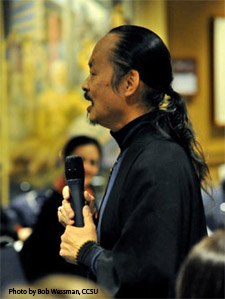 Commenter Flippityflopitty sends this link via email. Let’s Get Real About Racism: Lee Mun Wah:
Commenter Flippityflopitty sends this link via email. Let’s Get Real About Racism: Lee Mun Wah:
Before we can truly become a multicultural nation, we must have relationships based on respect and understanding, reflection and compassion; where our differences and our similarities are embraced, valued, useful and integrated into the very fabric of our workplaces, communities, schools and governmental institutions. I come from the belief that awareness and holidays are just the beginning. What is required is an ongoing dialogue and relationship with each other, one that allows for conflict and differences, questions and curiosity. To me, that is what a healthy and intimate relationship possesses. I hope that you will join me in making this not only a better world for our children, but for ourselves – not by starting tomorrow, but beginning today.
Let’s Get Real: What People of Color Can’t Say & Whites Won’t Ask
For People of Color:
1. What’s hard telling whites the truth about racism?
2. What’s the price of telling the truth about race relations in the U.S.?
3. Why do you think it’s so hard for whites to hear the truth about racism?
4. What would you say to whites if you could tell them the truth about racism?
5. In what ways do whites keep people of color from telling the truth about race/racism?
6. How have you learned to “play the game” to appease white folks?
7. What would it take for you to feel safe enough to tell the truth about race/racism to white folks?
8. What is the difference between talking about race and racism?
9. What is the illusion about race relations in the United States?
10. Are race relations getting wors e or better in the U.S? Why or why not?
11. Can you ever envision a world without racism? Why or why not?
12. What was your most profound experience with racism? How old were you? How did it affect you and how does it affect you today?
13. What do you think it will take for whites to truly embrace diversity?
14. In order to unlearn racism, what do you need or want from white folks?
15. What can’t you say about racism? Why or why not?
16. What does assimilation mean to you? Why?
17. When you have told the truth about racism, what has been some of your experiences? How have those outcomes affected you?
18. When talking about racism, what opens you up and what close you down?
19. What do you say to folks that feel that racism is no longer an issue now that we have a black president?
20. Do you think that your children will experience racism when they grow up? Why or why not?
21. How do you think whites can be effective allies to people of color?For Whites:
1. What’s good and what’s hard talking about racism?
2. How does guilt keep you from dealing with racism?
3. How do you think you benefit from racism?
4. What opens you up and what closes you down to talk about racism? Why?
5. What are some of your fears to bring up the issue of racism with people of color? With other white folks?
6. What do you need from people of color to feel safe to talk about racism?
7. What do you need from other whites to feel safe to talk about racism?
8. If you could say three things to people of color about racism, what would you say?
9. What do you think it will take for people of color and whites to trust each other?
10. Do you believe that racism is a learned behavior and attitude? If yes, why? If not, why not?
11. Where did most of your stereotypes about people of color come from? How did those stereotypes affect your perceptions and attitudes toward them?
12. What part do you think you play in perpetuating racism?
13. How do you think whites can be effective allies to people of color? Why?
14. What do you think it will take to unlearn racism for white folks?
15. What are some of the things that you are afraid to say to people of color?
16. What would be some questions you would like to ask people of color?
17. Why do you think many white folks don’t identify as a group?
18. When did you first experience racism? What happened and how did it affect you?
19. What percentage is your life is impacted by racism? Why or why not?
20. In what ways have you been able to avoid talking or dealing with racism?
21. Are there two Americas? Why or why not?
22. What does assimilation mean to you?
23. What does diversity or multicuturalism mean to you?
24. What do you think keeps people of color and whites apart?
25. What do you think it will take for the United States to heal from racism?
1. Why does anyone mistake this anti-White bigotry for “anti-racism”?
2. Why should Whites respect, embrace, or have any dialogue or relationship with people who blame us for all their problems?
3. How can we make them leave us alone?
4. Where can we go to get away from them?
5. If we somehow succeed in saving ourselves, how do we keep this from happening again?
